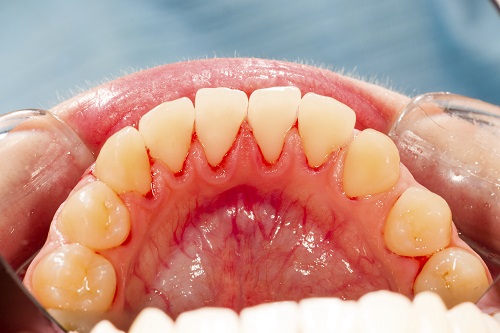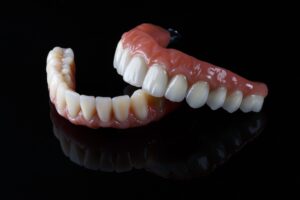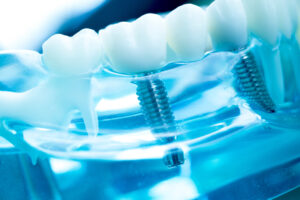Caused by the bacteria found in plaque, gum disease is extremely common and affects over 50% of American adults. Early stage periodontal disease, also known as gingivitis, is easily reversed through proper maintenance of your teeth, but what if you don’t have teeth? Are you still susceptible to gum disease?
The short answer is that yes, you can experience any stage of gum disease whether or not you have teeth. The older you get, the more likely you are to be diagnosed with periodontitis. Case in point: Around seven out of every 10 people over the age of 65 have this condition. (1)
This makes it even more important for you to keep your gums clean and watch for any early indicators that you may have the beginning of gingivitis or periodontitis. Remember: Some of the red flags of gum disease may not be as obvious as you think. This is especially true if you are missing teeth.
Lesser-Known Signs of Gum Disease
It’s a well-known fact that not taking care of your teeth can lead to gum disease; over time, the toxins released by the bacteria in plaque buildup can cause inflammation of your gums, leading to irritation and possible loss of your teeth.
However, the disease is called “gum disease” and not “tooth disease” for a reason – in absence of teeth, you are still absolutely vulnerable to periodontal disease.
Gum disease isn’t always painful, so it’s important to remain mindful of its symptoms to catch it before it progresses into a more advanced and dangerous stage. The signs of periodontal disease include:
- Gums that are red, shiny, and swollen
- A sour, metallic taste in your mouth
- Bad breath
- Bleeding and tenderness in your gums
Gum disease isn’t necessarily a cosmetic issue; failure to treat it can be deadly, and your risk is amplified if you don’t have teeth. Due to the natural recession of your gums as you age, the bacteria in your mouth can quickly travel to your bloodstream and bones. Over time, it can lead to a laundry list of problems such as heart attack, stroke, and even cancer.
How to Make Gum Disease Less Likely When You Have Few or No Teeth
So what can you do if you want to keep gum disease at bay? There are a few ways you can take care of your mouth, whether or not you have teeth.
Brush your gums:
You do not need to have teeth to use an extra-soft toothbrush on your gums. The brushing action will remove any debris from the gums. It will also stimulate the gums to keep the tissues healthy even as you age. (2)
Brush your tongue:
Bacteria and food particles will stick to your tongue and can lead to an unclean mouth. When you brush your gums with fluoride toothpaste, be sure to brush and massage the top of your tongue as well.
Use a mouth rinse:
Mouth rinses can make your mouth taste better. They can also be a last line of defense against germs that may linger even after you brush your gums, stimulate your gums, and brush your tongue.
Take care of your dentures:
Do you wear traditional removable dentures? Make certain to keep them sparkling every day. Dentures should be sanitized before every use to ensure that you are not introducing possibly harmful bacteria into your mouth.
Worried You Might Have Gum Disease? Call a Dentist!
Even if you take great care of your gums, you may experience gum disease. At that point, calling a dental professional like our team at Excellent Dental Specialists is essential.
Having teeth isn’t a requirement to visit our office. We care about our entire patient, not just what’s happening in your mouth! If you start to notice the signs of gum disease, please give our office a call right away to schedule a dental exam. We can thoroughly assess your mouth and, if we notice any degree of periodontal disease, we can promptly put you back on the path to good oral health through traditional and laser gum disease treatments!
Our dentist, Dr. Andrew J. Weber, has spent two decades helping patients improve the way they look and feel. During your visit, be sure to ask about the latest solutions for replacing missing teeth, such as full mouth dental implants. Schedule your consultation today!
References:
- Periodontitis, Cleveland Clinic, https://my.clevelandclinic.org/health/diseases/16620-periodontitis
- Effect of physical stimulation (gingival massage) on age-related changes in gingival microcirculation, US National Library of Medicine, https://www.ncbi.nlm.nih.gov/pmc/articles/PMC7239467/




